- Home
- Sherry Thomas
Ravishing the Heiress Page 9
Ravishing the Heiress Read online
Page 9
“Don’t look so put out, Millie. Something wonderful might come of this: We can have a child.” His other hand settled on her arm, the warmth of his palm branding her across the thin fabric of her sleeve. “I’ve never asked you, would you like a boy or a girl?”
“I don’t know.”
“You’d make a wonderful mother, kind but firm, attentive but not smothering. Any child of yours would be a fortunate child indeed.”
There had been a part of her, however small, however circumspect, that had always hoped perhaps when they at last consummated their marriage, their lovemaking would be the final alchemical ingredient to give wings to their friendship. But now it would serve only a biological function. Their friendship would remain earthbound—never to take flight.
The carriage came to a stop before the Fitzhugh town house. She pushed him away and leaped out.
CHAPTER 7
Alice
1888
The death of Fitz’s brother-in-law, Mr. Townsend, turned out to be quite a messy business.
Millie had met him only twice, at her engagement dinner and at the wedding breakfast. Both times her insides had been in turmoil and she’d gleaned only the most superficial impressions of the handsome, proud man.
It was a shock to learn of his death, but a greater one to find out the manner of it: He’d killed himself with an overdose of chloral. Even worse, unbeknownst to his wife, he had become bankrupt. It had necessitated the sale of his entire estate, along with the liquidation of a plot of land Mrs. Townsend had inherited from her parents, to appease his creditors.
Millie had believed that beauty like her sister-in-law’s must act as a powerful talisman, protecting one so blessed against storms and monsters, so that she sailed smoothly through life upon the twin currents of love and laughter. But it was not true. Misfortune hesitated for no one, not even a woman as lovely as Aphrodite herself.
As Mrs. Townsend drifted through the aftermath of her husband’s death, staggered and dazed, Millie, alongside Miss Fitzhugh, did her best to be useful. They made sure Mrs. Townsend ate enough, took her for drives so she wasn’t always sitting in a sunless parlor, and sometimes, sat in that sunless parlor with her, Miss Fitzhugh holding her sister’s hand, Millie in a nearby chair, finishing frames upon frames of embroidery.
Throughout the ordeal, Lord Fitzhugh was a rock. Gone was the disconsolate drunk. Daily he was at his sister’s side as they settled Mr. Townsend’s affairs, the epitome of consideration and sense—and forcefulness, when needed. An inquest had very nearly taken place, which would have turned a private death into a public spectacle. His uncompromising stance before a police inspector made the difference; in the end the police accepted the explanation that Mr. Townsend must have suffered from an unexpected hemorrhaging of the brain.
They stayed in London for six weeks before matters relating to Mr. Townsend’s estate were resolved. It was a largely somber time, but there were moments Millie treasured. Miss Fitzhugh imitating Lord Hastings and making her sister laugh, however briefly. Lord Fitzhugh and Mrs. Townsend sitting together, his arm around her, her head on his shoulder. Mrs. Townsend taking hold of Millie’s hand one day and telling her, “You are a wonderful girl, my dear.”
The day before they left London, the women took tea together. Miss Fitzhugh was to begin her classes at Lady Margaret Hall. Mrs. Townsend, after accompanying her sister to the women’s college at Oxford, would go to Hampton House, their childhood home in the same shire, which Lord Fitzhugh had put at her disposal.
“Are you sure you wouldn’t wish to come to Henley Park with us, Mrs. Townsend?” Millie asked one last time. She and Lord Fitzhugh had been trying to persuade Mrs. Townsend to stay with them at the estate he’d inherited alongside his title—to no avail.
“I have troubled you and Fitz enough,” said Mrs. Townsend. “But thank you, Millie—may I call you Millie?”
“Yes, of course.” Millie was aflutter that Mrs. Townsend wished to use the more familiar address of her given name.
“You will call me Venetia, won’t you?”
“And call me Helena,” said Miss Fitzhugh. “We are sisters now.”
Millie looked down at her hands to compose herself. She’d been brought up not to expect such intimacy from her in-laws, who were sure to sniff at being related to the Sardine Heiress. But Mrs. Townsend and Miss Fitzhugh—Venetia and Helena—had been helpful and accepting from the very beginning.
“I’ve…never had sisters,” she said, afraid she sounded too gauche. “Or any siblings.”
“Ha, lucky you. This means you never had anyone tell you that you were actually found in a bassinet under an apple tree when your parents went for a walk in the country.” Helena raised an eyebrow at Venetia. “Or that if you ate black-colored food, you’d have black hair like everyone else.”
Venetia shook her head. “No, that was Fitz. He wanted you to eat the blackberries so he’d have more raspberries to himself. It never occurred to any of us that you’d try squid ink.”
Millie listened with a sense of wonder at the oddity and camaraderie of children growing up in the same household. The warmth of that conversation still lingered as she and Lord Fitzhugh traveled in her parents’ private rail coach to Henley Park.
This time it was he who read—Edward Gibbon’s The History of the Decline and Fall of the Roman Empire, Volume IV—and she who stared out of the window. Most of the time. The rest of the time she studied him surrepti-tiously.
He had not regained all the weight he’d lost during his three weeks of strenuous inebriation—his clothes still hung slightly loose, his eyes were set deeper, and his cheekbones more prominent. But he no longer looked unwell, only lean and grave. His hair, cut short, lent a further austerity to his aspect, a solemnity beyond his years.
He set down his book, dug his hand into his pocket, and pulled out a—
“Is that a dormouse?”
He nodded. “This is Alice.”
Alice was tiny, with lovely golden brown fur and curious black eyes. He gave her a piece of hazelnut, which she nibbled with great enthusiasm.
“She’s getting chubby,” he said. “Probably will start hibernating within the week.”
“Is she yours? I haven’t seen her before.”
“I’ve had her for three years. Hastings has been taking care of her recently. I just got her back.”
Millie was enchanted. “Did you find her yourself?”
“No, she was a present from Miss Pelham.”
Isabelle Pelham. Millie’s smile froze. Fortunately he was not looking at her, his attention wholly occupied by Alice.
No wonder he had not brought Alice on their honeymoon.
“She looks darling,” Millie managed.
He stroked the fur atop Alice’s head. “She’s perfect.”
He did not offer Alice for Millie to hold. And she did not ask.
It was not easy, remaining sober.
Some nights, when he could not sleep, when he missed Isabelle so much he could scarcely breathe, Fitz thought of things that might help him: whisky, laudanum, morphia. He thought especially hard of morphia, of the lovely torpor it would bring, the long forgetfulness.
The house had such things—he’d seen them when he’d first inspected Henley Park. So he left the house, to walk and run—mostly run—until he was overcome with exhaustion.
He also, once he put his mind to it, realized that there was an easier way of alleviating his loneliness: naked women. He took up with one of his new neighbors, a widow five or six years older than him, who was more than glad to have him service her repeatedly.
Alice began her hibernation. He kept her in a padded, ventilated box and checked on her twice a day. Everything had changed. Alice remained the one familiar touchstone, a link to life as he’d known it.
Two weeks after they arrived at Henley Park, his wife sent him a message, wishing to see him in the library. Except at dinner each night, he hardly saw her at all, though he knew she kept h
erself busy during the day, as he did, with matters concerning the house and the estate.
The library, dour and smelly, was in the north wing, the worst part of the house. She was examining books for damage. He was surprised to see her in a day dress of russet silk. Since Mr. Townsend’s death, she’d worn mourning colors, a silent, somber ghost at the periphery of his awareness. But today the vibrant, autumnal hue of her dress made her the brightest object in the room.
“Good morning,” he said.
She turned around. “Good morning.”
For a moment he was struck by how young she looked without a dark, drab garment to age her. Had he passed her on the street, he might have thought her fifteen.
Had the Graves lied about her age? “Excuse me, but how old are you again?”
“Seventeen.”
“Seventeen? Since when?”
She lowered her gaze, as if embarrassed. “Since today.”
Now he was equally embarrassed. He’d had no idea. “Happy birthday.”
“Thank you.”
An awkward silence fell. He cleared his throat. “I don’t have a present for you. Is there anything you’d like—and can be found in the village?”
She waved a dismissive hand. “A birthday is just another day. I think it’s terribly silly that people make such a to-do about it. Besides, your sisters have already sent books and a pretty box of new handkerchiefs.”
“If Venetia, with all her troubles, can remember, then I have no excuse—except that I didn’t know the date at all.”
“Please don’t worry about it—there’s always next year. Now, would you mind looking at some of the rooms with me?”
He’d already seen all the rooms, but since it was her birthday…“Lead the way,” he said.
She’d obviously examined each room multiple times, and had taken copious notes of all the damages. It was a guided tour of the north wing’s failings. As they walked on, she reported an ever rising estimate of how much it would cost to repair everything.
They were only on the third room of the next floor when he said, “We should dynamite this entire house.”
“That would be rather an extreme course of action,” said his wife. “But I would have no objection to getting rid of this wing.”
He stopped cold. “What did you say?”
“According to the ledgers and the plans, this wing was an addition undertaken at the beginning of the century—the original house’s wall, if I’m not mistaken, would have been right there. From what I can tell, there was no particular reason for the addition, except that the then-earl was jealous of his cousin’s newer, better house and wished to compete.”
And the family had been in debt ever since.
“I know you were jesting when you said to dynamite the house, but I’d like to submit for your sober consideration the idea of not renovating the north wing. It was poorly conceived and even more poorly built. Even if we patch everything today, we’d still need to be constantly vigilant against new leaks, rots, and cracks.”
The north wing was two-fifths of the manor. He stared at her a moment—she was perfectly serious. The girl had audacity. But of course she did: She’d singlehandedly pulled him back from the brink of a precipice.
“All right. Let’s do it.”
At his assent, she was the one who was taken aback. “Do you think we might need to petition parliament for something like this?”
He thought for a moment. “One doesn’t petition parliament before an accident takes place, does one?”
She smiled. “No, indeed one doesn’t. And our discussion never happened.”
He smiled back.
She dipped her head. “Now if you will excuse me, I must decide whether any of the books are worth keeping.”
It was only later in his room, gazing at a peacefully slumbering Alice, that Fitz realized he and his wife had just made their first joint decision as a married couple.
That evening Millie dined alone. Lord Fitzhugh sent a note saying he would take his supper at the village pub. Supper was probably a euphemism for a woman. Not that she begrudged him a little pleasurable distraction, but she wished—
No, she did not wish that he’d come to her instead. She did not want to be used for only that purpose. But she could not help envying his lovers. She, too, would like to know what it was like to be touched and kissed by him—when he was sober. There was a physical grace to him, a manner of movement that was swift and easy. She could not help imagining what it would be like, someday, for him to suddenly notice her not merely as his wife, but as a woman, a desirable one.
But she always cut those reveries short, whenever she discovered herself in the middle of one. Perhaps there was nothing she could do about hope springing eternal, but she would not water or tend it. She would prune it harshly, ruthlessly, the way she would a weed in the garden.
After dinner, she sat in the drawing room, studying. She’d decided to take her mother’s advice and create a beautiful garden. But the pleasure garden would have to wait until she had first restored the more utilitarian kitchen garden. The estate had one such, but with the departure of the head gardener nearly a decade ago, it had grown wild.
She pored over an old diagram for the walled garden, consulting her handbook on horticulture. Salsify she’d eaten. Celeriac she hadn’t, but had at least heard of. But what in the world was a scorzonera? Or a skirret? Or a cardoon, for that matter?
She was searching for couve tronchuda in an encyclopedia when her husband surprised her by striding into the drawing room—she’d thought he’d remain out until long after she was abed.
“Good evening,” she said.
Perhaps it was the light, but he looked…strapping. Her heart stuttered.
“Evening,” he answered, standing with his hands behind his back. “I was at the village pub tonight. We’ll have twenty able-bodied men here tomorrow to dismantle the north wing—or at least to begin the work.”
“So soon!”
Her father took forever on his decisions. Even when he agreed to a change in principle, he’d still dither for years over the specifics of its implementation. She had not remotely anticipated that Lord Fitzhugh would set about the overhaul of Henley Park this quickly.
He looked about the drawing room. She’d had makeshift new curtains and carpets brought in, but it was still a dismal place—there was no point in replacing the curling, water- and soot-stained toile wallpaper until they had a new roof and better chimneys. “Not soon enough,” he said. “At least fifty years too late.”
When they’d first arrived in the country, she’d worried that he might re-embrace whisky. But it was sobriety that he clasped tight and did not let go. During the day he, like she, threw himself into his duties. At night, instead of turning to the bottle, he turned to the outdoors. Sometimes she, waiting beside her window in the dark, would see him return, hunched over before the manor, his hands on his knees, breathing hard with exertion.
All because of this cursed house, half of which someone should have demolished fifty years ago.
But his voice was calm. What had been done had been done. There was no use pointing fingers at the dead or at forces beyond his control that had sent agricultural prices stumbling in their lifetime.
“And this is for you.” He handed her a brown-paper package that he’d hid behind his person. “I stopped by the general merchandiser’s. But the selection was paltry. I chose the least terrible of the lot.”
She was astonished. “You didn’t need to.”
Inside the package was a rather plain music box that must have sat on the shop’s shelves for the better half of a decade. Even with the obvious signs of recent cleaning, its corners and creases were still encrusted with dust. When she opened it, it played a few tinny, scratchy bars from “Für Elise.”
“As I said, it’s not much good.”
“No, it’s fine. Thank you.” It took a great effort for her to not hug the music box to her chest. “I will keep it well.�
��
“I’ll do better next year.” He smiled. “Good night.”
“Good night,” she answered.
Some hopes were weeds, easy to eradicate with a yank and a pull. Some, however, were vines, fast growing, tenacious, and impossible to clear. As she played the music box again, alone in the drawing room, she began to realize that hers were of the latter kind.
She would never stop hoping.
The last thing Millie expected to see was her husband on the roof of the house, stripping the slate tiles alongside the men he’d hired. He was in old tweeds and a woolen cap. She’d nearly mistaken him for a village lad until someone addressed him as “milord.”
“What are you doing, Lord Fitzhugh?”
“I’m supervising the men.”
“You seem to be working with the men, if my eyes don’t deceive me.”
He tossed a tile at an older man, who passed it to another, who in turn slid it down a long chute set at forty-five degrees. The tile was caught on the bottom by one of two waiting men and, after passing through a few more hands, carefully placed in stacks.
“Your eyes do deceive you!”
“So they must,” she shouted back and left him to it.
It was quite ungentlemanly of him to be performing manual labor. But come to think of it, his days at Eton had been heavily driven by sports—association football in the Michaelmas Half, field game during the Easter Half, and come the Summer Half, cricket. The sedentary nature of married life must contribute to the ennui of it. And the demolition of the north wing, besides the satisfaction of literally destroying the house that had derailed his life, provided an outlet for a young man’s pent-up energy.
It also gave them something to talk about at dinner, the only time of the day they spent in each other’s company and not much time at that, as he had no use for protracted dinners—in fact he still ate like a student, with a speed she found difficult to match.
So it was during the taking down of the north wing that she learned about the nest of bats in the attic, the mold that had been growing inside the plaster, the fact that the oldest man in the demolition party had fought in the Crimean War in his youth. She told him of her plans to build an electrical plant on-site, wire the house with electricity, and modernize the plumbing.

_preview.jpg) Claiming the Duchess (Fitzhugh Trilogy Book 0.5)
Claiming the Duchess (Fitzhugh Trilogy Book 0.5)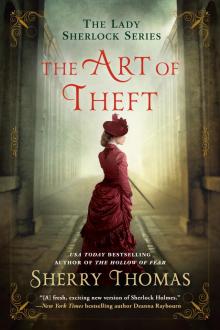 The Art of Theft
The Art of Theft The Magnolia Sword: A Ballad of Mulan
The Magnolia Sword: A Ballad of Mulan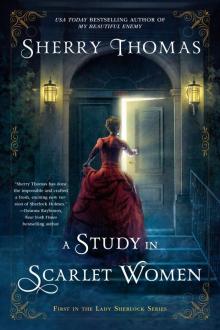 A Study In Scarlet Women
A Study In Scarlet Women The Hollow of Fear
The Hollow of Fear The Magnolia Sword
The Magnolia Sword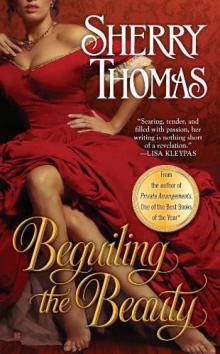 Beguiling the Beauty ft-1
Beguiling the Beauty ft-1 The Heart is a Universe
The Heart is a Universe The Hidden Blade: A Prequel to My Beautiful Enemy (Heart of Blade)
The Hidden Blade: A Prequel to My Beautiful Enemy (Heart of Blade)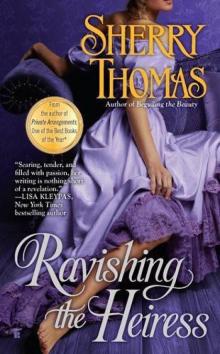 Ravishing the Heiress ft-2
Ravishing the Heiress ft-2 The Immortal Heights
The Immortal Heights The Hidden Blade
The Hidden Blade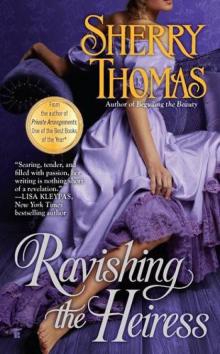 Ravishing the Heiress
Ravishing the Heiress Tempting the Bride
Tempting the Bride The Luckiest Lady in London
The Luckiest Lady in London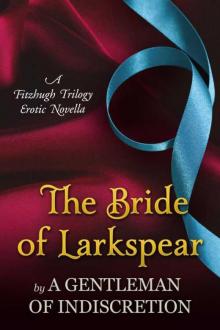 The Bride of Larkspear: A Fitzhugh Trilogy Erotic Novella
The Bride of Larkspear: A Fitzhugh Trilogy Erotic Novella Claiming the Duchess
Claiming the Duchess The One in My Heart
The One in My Heart His At Night
His At Night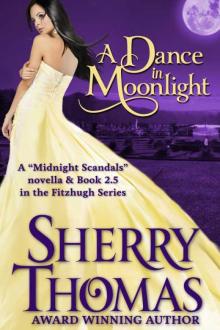 A Dance in Moonlight
A Dance in Moonlight A Conspiracy in Belgravia
A Conspiracy in Belgravia Not Quite a Husband
Not Quite a Husband